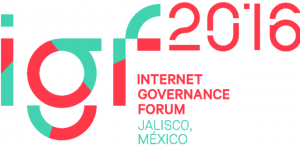I´ve coordinated with Paz Peña the 188 workshop session at IGF 2016 intitled Smart Cities in the Global South – challenges and opportunities with the speakers: Olga Cavalli (ITU), Amber Sinha (Center for Internet and Society), Catherine Garcia (Hague University), Victor Larios Rosillo (University of Guadalajara) and Romina Garrido (Datos Protegidos)
Description of the session:
The concept of Smart Cities has attracted considerable attention in the development of urban policies in the Global South. In them, the role of the Internet of Things (IoT) is fundamental: it supports added-value services for the administration of the city and for the citizens.
Smart Cities are presented as the final technical answer that can organize the supposed chaos of cities, which is particularly attractive for large Global South cities, often considered chaotic clusters plagued of violence and ineffective systems. Even more, for some of their advocates in developing countries, Smart Cities and IoT efficiently drive sustainable economic growth, competitiveness and prosperity.
But critical visions assert that the adoption of Smart Cities has been made without an open and democratic discussion addressing relevant Global South’s problems on inclusive and sustainable growth, as: the persistent technological dependence from the North, the weak protection of personal data in the majority of countries, the lack of an affordable and inclusive internet, the evidence that States are trying to control their citizens within the public space, among many other issues.
The way IoT is conceived, adopted and regulated in the context of Smart Cities in the Global South, affects directly or indirectly the sustainable economic growth and the exercise of human rights. This workshop will be the opportunity to expose the nuances of adopting Smart Cities, with an special focus in the challenges on public policies that IoT implies in the context of developing countries with weak democracies.
